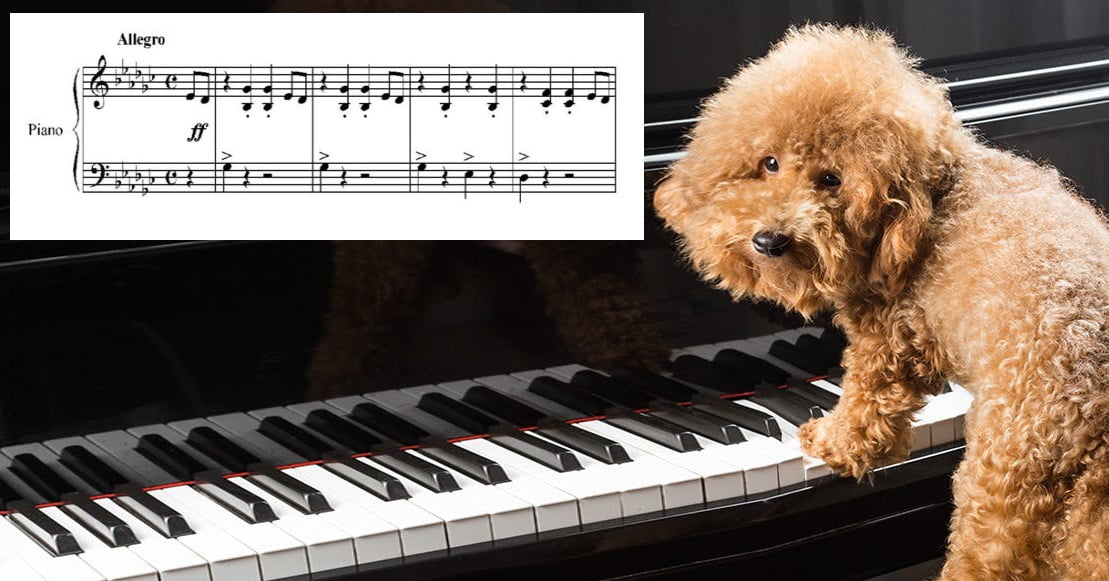It is widely believed that one of the most famous melodies in the world, which even people far from music can play on the piano, was written by Frederic Chopin. We checked if this is true.
The short musical piece, which in Russia is known as the “Dog Waltz,” is often attributed to the great Polish composer. Moreover, this is done not only by people far from classical music, but also by themselves performers. Despite its apparent simplicity, the play in all its variations and arrangements is very popular among professionals. In particular, the mention of Chopin in the credits can be found on the channels Military Music Center of the Ground Forces Armed Forces of Ukraine and the famous Moscow music school "Virtuosi". Literature lovers may be familiar with the following quote from Mikhail Zoshchenko’s play “Dear Comrade” (1930):
“And so as not to get bored, the teacher, Madame Ershova, as part of her social work, let her compose something divine for us on the piano, some sort of Chopin’s dog waltz...”
First of all, it should be noted that the name “Dog Waltz” is not assigned to this play almost anywhere outside the post-Soviet space. In 1994, Japanese musicologist Hiromi Oketani published an article about the results of her research on this topic. This is how the world learned that in Japan itself, a simple work translated into Russian is called “I stepped on a cat.” Cat moods also prevail in Bulgaria, Finland, Korea, but in Germany, Belgium, the Netherlands and Norway the play is known as “The Flea Waltz.” In Mexico it is “Little Monkeys”, in Hungary it is “Donkey March”, in China it is “March of Thieves”. The Spaniards name the play after the dishes - “Chocolate Girl”, and in many other European countries the funny work has “gastronomic” names: in France and Poland - “Cutlets”, in Switzerland - “Cutlet Waltz”, in Denmark - “Meatballs Run Over the Fence”. The Swedes call the melody “Kalle Johansson”, and the song of the same name is to blame for this song 1962 Tore Skogman.
Another important fact is that Frédéric Chopin actually has a piece that is colloquially known as “The Dog Waltz.” We are talking about the waltz in D flat major op. 64 No. 1, the melody of which is also well known to many of you, performed by the most outstanding pianists of his time. Here, for example, is Arthur Rubinstein’s version:
The publishers dubbed this short piece the “Minute Waltz,” but Chopin himself called it the “Waltz of the Little Dog.” According to one of versions, Chopin's beloved George Sand asked her to dedicate a waltz to her dog. By another, Chopin was inspired by his own puppy, gracefully trying to catch its tail. One way or another, the name stuck and remains in wide use today - both in the form of “Waltz of the Little Dog” and in the form of “Dog Waltz”. Most likely, it was this work that Mikhail Ivanovich Zoshchenko had in mind, since Chopin’s play really fits the definition of “divine” better. And officially it is dedicated to another muse of the composer - Countess Delphine Pototskaya.
As for the authorship of that very little thing that children and adults of the post-Soviet space call the “Dog Waltz,” it has not yet been determined. It is reliably known that this melody does not appear in the scores of more or less famous composers. On sale you can find a book by the German Eric Bauman "Composer Ferdinand Law and his magnum opus - "Flea Waltz"". However, this biography is nothing more than a hoax, and the initial with the surname F. Loh is derived from the word floh (“flea”). According to the information available today, “Dog Waltz” can well be called a folk melody.
Not true
Read on topic:
2. Chopin-Schaum, Book One: Based on Events and Episodes of Chopin's Life.
If you find a spelling or grammatical error, please let us know by highlighting the error text and clicking Ctrl+Enter.







